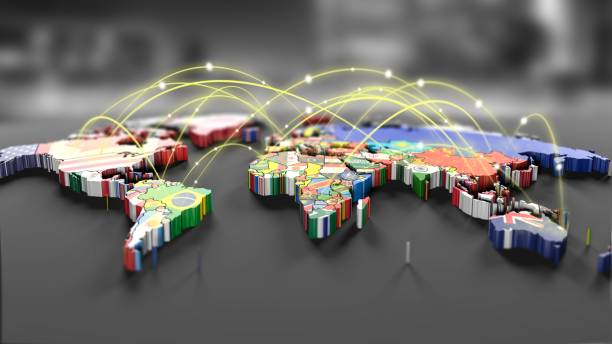Table of Contents
Geopolitical tensions have historically been a significant driver of global trade fluctuations. As nations grapple with political, economic, and ideological differences, trade flows can be disrupted, leading to economic consequences for both exporting and importing countries.

Understanding the Impact of Geopolitical Tensions
Geopolitical tensions can impact global trade in several ways:
- Trade Barriers: Tensions often lead to the imposition of trade barriers, such as tariffs, quotas, and sanctions. These measures can significantly increase the cost of goods and services, reducing trade volumes and harming businesses on both sides of the trade relationship.
- Supply Chain Disruptions: Tensions can disrupt supply chains, leading to delays, shortages, and increased costs. For example, geopolitical events can lead to conflicts that disrupt transportation routes or damage infrastructure.
- Investor Uncertainty: Geopolitical tensions can create uncertainty among investors, leading them to reduce their investments in affected regions. This can hinder economic growth and reduce demand for goods and services.
- Currency Fluctuations: Geopolitical tensions can lead to currency fluctuations, which can impact the competitiveness of exports and imports. For example, a weaker domestic currency can make exports more competitive, but it can also increase the cost of imports.
Recent Examples of Geopolitical Tensions Impacting Trade
- US-China Trade War: The trade war between the United States and China, which began in 2018, has had a significant impact on global trade. Both countries have imposed tariffs on billions of dollars worth of goods, leading to increased costs for consumers and businesses.
- Brexit: The United Kingdom’s decision to leave the European Union has created uncertainty and disrupted trade flows between the UK and the EU. Negotiations over a trade deal have been complex and have led to temporary disruptions in trade.
- Russia-Ukraine War: The ongoing war in Ukraine has had a devastating impact on the global economy, including disruptions to energy supplies, food exports, and trade routes. Sanctions imposed on Russia have also had a significant impact on global trade.

Mitigating the Impact of Geopolitical Tensions
While it is difficult to completely eliminate the impact of geopolitical tensions on global trade, there are strategies that businesses and governments can adopt to mitigate these effects:
- Diversification: Businesses can diversify their supply chains and markets to reduce their exposure to geopolitical risks. This can help to ensure that they can continue to operate even if one region or country is affected by tensions.
- Risk Management: Businesses can implement risk management strategies to identify and assess potential risks associated with geopolitical tensions. This can help them to develop contingency plans and mitigate the impact of disruptions.
- Government Cooperation: Governments can work together to reduce tensions and promote cooperation. This can involve diplomatic efforts, trade negotiations, and international agreements.
- Technological Innovation: Technological advancements can help to reduce the impact of geopolitical tensions on global trade. For example, advancements in transportation and communication technologies can help to diversify supply chains and reduce reliance on traditional trade routes.

Conclusion
Geopolitical tensions continue to be a significant factor in shaping global trade. While it is impossible to eliminate these tensions entirely, businesses and governments can take steps to mitigate their impact and promote a more stable and resilient global trading system. By understanding the factors that drive geopolitical tensions and implementing effective strategies, it is possible to navigate these challenges and foster economic growth and prosperity.

